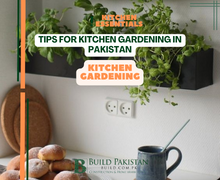Tips for Kitchen Gardening in Pakistan

Introduction:
Kitchen gardening has become a popular trend in
Pakistan in recent years, as more and more people are becoming interested in
growing their own fruits, vegetables, and herbs. In this blog, we will discuss
the concept of kitchen gardening in Pakistan, its benefits, the types of plants
that can be grown, and how to get started.

Benefits of Kitchen Gardening
There are several benefits of
kitchen gardening, including:
Access to fresh produce:
With a kitchen garden, you have
access to fresh and organic fruits, vegetables, and herbs that are free from
harmful chemicals and pesticides.
Cost-effective:
Growing your own produce can be a
cost-effective way to save money on groceries, as you won't have to buy
expensive imported fruits and vegetables.
Healthier lifestyle:
By consuming fresh and organic produce,
you can maintain a healthier lifestyle, as these foods are packed with
essential vitamins and minerals.
Reducing carbon footprint:
Kitchen gardening can help reduce
your carbon footprint by reducing the amount of transportation required to
bring food from farms to supermarkets.
Types of Plants That Can Be Grown
In Pakistan, the climate
varies from region to region, which affects the types of plants that can be
grown in a kitchen garden. However, some of the most popular plants that can be
grown include:
- Tomatoes
- Cucumbers
- Peppers
- Beans
- Okra
- Coriander
- Mint
- Basil

Getting Started with Kitchen Gardening
Kitchen gardening is an excellent way to grow your own fruits, vegetables, and herbs at home. It's a fun and rewarding hobby that can provide fresh, healthy produce right in your own backyard. If you're interested in starting your own kitchen garden in Pakistan, here are some tips to help you get started:
Choose the right location:
The first step in starting a
kitchen garden is to choose the right location. The ideal location for a
kitchen garden is an area that receives plenty of sunlight, is well-drained,
and has easy access to water. You should also consider the size of the space
and the types of plants you want to grow. Some plants require more space than
others, so it's important to plan accordingly.
Prepare the soil:
Once you've chosen the location, it's time to prepare the soil. Remove any weeds and debris from the area and add organic matter such as compost or manure to the soil to improve its fertility. If the soil is heavy and compacted, you may need to till it to improve drainage and aeration.
Choose the right plants:
Choosing the right plants is crucial
for the success of your kitchen garden. Consider the climate and soil
conditions in your area when choosing your plants. Some plants grow better in
hot and dry conditions, while others prefer cooler temperatures and more
moisture. It's also important to choose plants that are suited to the amount of
sunlight and space available in your garden.
Water and fertilize regularly:
Once you've planted your
garden, it's important to water and fertilize your plants regularly. Most
plants require about an inch of water per week, either from rain or watering.
Be careful not to overwater your plants, as this can cause root rot and other
problems. Fertilize your plants every two to four weeks with a balanced
fertilizer to promote healthy growth.
Harvest regularly:
One of the most rewarding aspects of
kitchen gardening is harvesting your own produce. Harvest your fruits and
vegetables regularly to ensure that they are at their peak freshness and
flavor. Most plants are ready to be harvested when they are firm and brightly
colored.
Protect from pests:
Pests such as aphids, snails, and slugs
can damage your plants and reduce your yield. To protect your plants from pests,
use natural pesticides or companion planting. Companion planting involves
planting certain plants together that repel pests or attract beneficial
insects.

Conclusion:
In conclusion, kitchen gardening has gained immense
popularity in Pakistan due to its numerous benefits. It provides easy access to
fresh, organic, and healthy produce that is free from harmful pesticides and
chemicals. Not only is it cost-effective, but it also promotes a healthier
lifestyle and reduces the carbon footprint by reducing transportation of food
from farms to supermarkets. With proper planning, care, and a little bit of
effort, anyone can start their own kitchen garden and enjoy the satisfaction of
growing their own food. So why not give it a try and see how it can transform your
life for the better!









